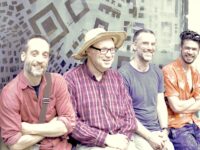Christian Scott’s Live at Newport was only the latest illustration that the New Orleans tradition is alive and well. Of course, that New Orleans tradition is about so much more than the conventional idea of “tradition.”
More than a century after the Crescent City gave us cornetist and jazz pioneer Buddy Bolden, kicking off an amazing string of brass legends going from Louis Armstrong to Wynton Marsalis to Terence Blanchard, another ground-breaking trumpet player from this storied city emerged. His name was Christian Scott; later, he became known as Christian Scott aTunde Adjuah.
Like Marsalis, Scott was born into New Orleans music: His uncle is Donald Harrison. But unlike Wynton, Scott didn’t dwell on the old ways at the beginning of his career before putting his own imprint on jazz. True, he played a trumpet with a bent-up bell like Dizzy Gillespie did and borrows some of Dizzy’s licks here and there, but Scott sounded more like a young Enrico Rava.
In 2007, the promising young trumpeter began to deliver on the promise with Anthem, marrying already advanced chops with music that was open, loose, and dramatic. It was what I’d call jazz-rock fusion, but one that fuses jazz with 21st century rock – not baby boomer rock – while still respecting the acoustic soul of straight-ahead jazz. The song structures that Scott employed still allow plenty of room for all the players to stretch out. It’s the kind of music that’s optimal for live performances.
And that’s evidently what Christian Scott himself thought, too. Live at Newport, released on November 4, 2008, was the result. A document of a performance made a mere three months earlier, Newport combined concert versions of songs taken from Anthem and his first album Rewind That, as well as a few new Scott compositions. Furthermore, the accompanying DVD contained actual footage of the entire performance on the compact disc, as well as some extras like Scott talking about his career and the record as well as some film of his band rehearsing at his old school, the Berklee School of Music in Boston.
The impetus for this record and video footage was Scott’s belief that jazz – especially for jazz musicians from his generation – has “turned into an academic affair” and he felt that “the artist experience” is of paramount importance. I couldn’t agree more.
Christian Scott’s band for Newport contained members whose highly individualistic styles had done much to shape his music; they also shared Scott’s desire to incorporating contemporary influences into jazz. His pianist was Aaron Parks, whose impressive major-label debut Invisible Cinema had just been released to rave reviews. There was also an imaginative electric guitarist in Matthew Stevens. Joe Sanders handled stand-up bass, and the very active Jamire Williams manned the drums. Parks and Stevens were carried over from Anthem, which is critical since these two were responsible for creating much of the distinctive rock motifs found on Anthem. Tenor saxophonist Walter Smith III joined with the band for most of the eight selections.
The set opened with a new number Christian Scott penned, “Died in Love.” It was inspired by the murder of a close friend and his new wife. Thus, it’s a dirge, but one that goes through the range of emotion that one endures through such a tough loss. Parks, Stevens and Williams’ stumbling drums added dramatic effect as Scott gave a sublimely heart-felt performance. “Litany Against Fear,” another tense composition of Scott’s, was arguably his best song from Legend. Smith made his first appearance on Live at Newport here, stating the theme with Scott, and later putting in a fiery solo.
Parks’ familiar, persistent single-note repetitions paced a darkly dramatic beginning passage that alternated with a more affirming chord progression. Stevens was given plenty of solo space and provided some dazzling fretwork. (It was even more fun to watch it on the DVD). Scott himself put on a clinic, with a cleanly played tone that traded in fancy trips up and down scales for making each note meaningful. The song transitioned into a thematic statement repeated by Parks and Stevens, and, unlike the studio version, the horns joined in the statement at the end with Scott adding an exclamation point at close. Great song, great performance.
The rest of Live at Newport didn’t quite have the intensity of the first two cuts, but are still worthy listens. “Isadora” showed off Christian Scott’s ability to render a ballad sweetly, without relying on a mute. “Rumor,” one of a pair of compositions by Stevens, began with an extensive, well-modulated drum sole by Williams before he settled into a nice funky rhythm for Scott to groove over. “Anthem” featured some insanely intricate piano soloing from Parks.
Stevens’ other song “The Crawler” was a slower-paced tune where Smith supplied a particularly soulful tenor. “James Crow Jr., Esq.” was built from an urgent riff and Stevens again provided another choice solo. The set closer “Rewind That” came from Scott’s first, Grammy-nominated album of the same name, but was re-imagined here alongside a mostly new band with some complex harmonics and an ever-restless rhythm.
Although Scott’s music and even his trumpet playing are (ahem) miles apart, Scott and his band turned heads with his Newport appearance just as Miles Davis did exactly 50 years prior. And he did it in the same individualistic way, becoming the latest in New Orleans’ history of forward-thinking jazz musicians. Today, Christian Scott stands as a new embodiment of that much different kind of tradition.
- Ches Smith Quartet – ‘Clone Row’ (2025) - May 30, 2025
- James Brandon Lewis Quartet – ‘Abstraction Is Deliverance’ (2025) - May 27, 2025
- Soft Machine – ‘Drop’ (1971, 2025 remaster) - May 21, 2025


